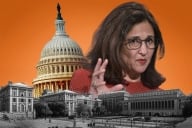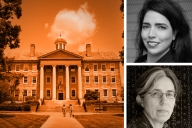You have /5 articles left.
Sign up for a free account or log in.
The number of college presidents announcing their retirements has only picked up steam in recent years as the average age of institutional leaders continues to increase.
And many of these presidents are concerned about the future of their positions.
So the Aspen Institute, along with a task force of 35 college and university leaders it assembled, is releasing a report today that details the challenges college presidents face and what will be required for the next generation of leaders to succeed.
Colleges and universities are facing growing pressure to help people reach their own opportunities to get ahead in life and to improve the nation’s economy, but there hasn’t been enough attention paid to improving the leaders at these institutions, said Josh Wyner, executive director of the Aspen Institute's College Excellence Program. Aspen also operates a presidential fellowship program to prepare people who have recently been appointed as, or aspire to be, a community college president.
“We’re really interested in what is the college presidency today and what do we need it to be tomorrow and how do we bridge the gap between what is needed today and tomorrow,” Wyner said.
Each of the 35 presidents was interviewed separately and in groups over 18 months, and they come from a mix of rural, suburban and urban community colleges and liberal arts, regional and research universities.
“Being a university president is much more complicated today than even being a CEO of a huge Fortune 500 company,” said Ronald Crutcher, president of the University of Richmond, in Virginia. “Back in the late 1960s, most people who became president committed themselves to a life in higher education and therefore to some extent were educators … or researchers and scholars. Now there is more of an emphasis on issues that take those of us in leadership positions away from those main concerns and to concerns that are broader.”
Crutcher said those broader issues include alcohol abuse, sexual assaults on campus and mental illness.
According to the report, turnover in college presidents and senior leaders is increasingly becoming a concern. The average age of college and university presidents has increased from 52 to 61 in two decades, according to the American Council on Education. Meanwhile, 80 percent of current community college leaders are expected to retire in the next decade, according a 2015 report from the American Association of Community Colleges.
“The challenges are more common than different for the different sectors,” Wyner said. “The control over messaging was a really big issue for a number of them. A lot of them came up in an era where if a crisis arose, they were the first to know … but today the reality is there may be thousands or hundreds of thousands who know before them, and responding to crises in those moments is significant.”
One other common challenge the presidents said they face is the political dynamic between public institutions, state legislatures and governors’ offices, Wyner said, adding that the expectations from political groups nationally and in their own states often feel different or separated from the funding streams, or lack thereof, they may receive from politicians.
“A number of them felt strongly about the intersection between the rising need to deliver higher levels of student success, increasing accountability from legislatures and a changing student body,” Wyner said. “All of those things are changing pretty rapidly, and it’s hard to know how to move. They didn’t lament the old days, but rather with those three things changing so fast, they want to know how do they adapt with what’s happening on campus quickly enough to respond to the expectations of the outside world.”
The task force recommends that colleges improve professional development and create learning opportunities for new and veteran presidents. The report also recommends giving boards of trustees more support and assistance to work with presidents, and finding ways to identify and develop diverse presidential talent pools.
“We have to ask ourselves and our boards, are we developing and identifying talent, faculty and staff who can move into high-level positions, and are we getting them the experience to prepare them for the presidency?” said Freeman Hrabowski, president of the University of Maryland Baltimore County, and a member of the task force.
That diversity doesn't just include more women or people of color. The report encourages presidential search committees to seek out candidates from other industries and fields besides education who can bring unique skills to their colleges, but it also warns that those same boards should be prepared to provide more professional development and training to candidates who come from outside the traditional academic world.
Hrabowski said one thing that has changed in the 25 years he’s been UMBC’s president has been the need for presidents to express clearly the value of a college education.
“In a time when people are questioning how much education is needed, we have to be able to show our institutions have a particular mission and role to play in our communities and nation and beyond,” he said, adding that it has become more challenging today because technology and social media demand college leaders to speak on issues and be responsive as quickly as possible.
Presidents aren’t proving the value of a college education just to the public, but oftentimes to policy makers and state legislators who may be skeptical about the mission of the institutions, Crutcher said.
Ultimately, the task force hopes that presidential search committees and college boards will work to implement the changes recommended in the report, especially if they want future presidents to be successful, Wyner said.
“Hopefully this will help certain schools and boards be open about the backgrounds they’re looking for in a president, and what is more important is the skill set a person brings,” Crutcher said. “Do they have the skill set of an executive? Do they have a high degree of emotional intelligence? These things are more important today than whether they have a doctorate degree.”
The 35 members of the task force are:
- Jonathan Alger, president, James Madison University
- Mark Becker, president, Georgia State University
- Nancy Cantor, chancellor, Rutgers University-Newark
- Ronald Crutcher, president, University of Richmond
- Waded Cruzado, president, Montana State University
- Mitch Daniels, president, Purdue University
- Michael Drake, president, Ohio State University
- John Fry, president, Drexel University
- Juliet Garcia, president emeritus, University of Texas at Brownsville
- Rufus Glasper, president and chief executive officer, the League for Innovation in the Community College
- Philip Hanlon, president, Dartmouth University
- Dianne Harrison, president, California State University-Northridge
- Freeman Hrabowski III, president, University of Maryland Baltimore County
- Brian Johnson, president, Tuskegee University
- Stephen Jordan, president, Metropolitan State University of Denver
- Elizabeth Kiss, president, Agnes Scott College
- Leo Lambert, president, Elon University
- Elaine Maimon, president, Governors State University
- Mary B. Marcy, president, Dominican University of California
- Ronald Mason Jr., president, University of the District of Columbia
- David Oxtoby, president, Pomona College
- Dan Porterfield, president, Franklin & Marshall College
- Carol Quillen, president, Davidson College
- Scott Ralls, president, Northern Virginia Community College
- Mary Rittling, president, Davidson County Community College
- Felix Matos Rodriguez, president, Queens College
- Debra Saunders-White, former president, North Carolina Central University
- William Serrata, president, El Paso Community College
- Sandy Shugart, president, Valencia College
- Lou Anna K. Simon, president, Michigan State University
- Michael Sorrell, president, Paul Quinn College
- Mary Spilde, president emerita, Lane Community College
- Karen Stout, president and chief executive officer, Achieving the Dream
- Bob Templin, president emeritus, Northern Virginia Community College
- Eileen B. Wilson-Oyelaran, president emerita, Kalamazoo College








